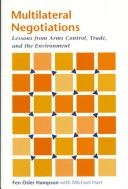In recent years, issues about the environment, international economics, and international security have all been the subject of multilateral negotiation. Unlike conventional bilateral negotiations -as, for example, in a peace treaty - multilateral negotiations are characterised by intensive international discussions that involve multiple actors and interests, highly complex agendas, and differentiated intemational settings. The topics of such negotiations have ranged from climate change and ozone depletion to conventional arms control, from nuclear proliferation to intemational trade and monetary relations. Political scientist Fen Osler Hampson, with the assistance of trade specialist Michael Hart, studies the component parts of the multilateral negotiation process to identify those factors making for success or failure. The authors argue that multilateral negotiation is, in essence, a coalition building enterprise involving states, nonstate actors, and international organisations.
Ranging from the 1963 Test Ban Treaty to the Climate Change Convention (1992) and the completion of the Uruguay Round of GATT (1993), individual case studies include discussions on security, environment, and economic issues. Of particular interest is the attention given to non-governmental actors such as scientists and environmental groups like Greenpeace International-in prenegotiation and negotiation phases.
- ISBN10 0801849993
- ISBN13 9780801849992
- Publish Date 1 May 1995
- Publish Status Out of Stock
- Out of Print 22 October 1999
- Publish Country US
- Imprint Johns Hopkins University Press
- Format Hardcover
- Pages 472
- Language English
